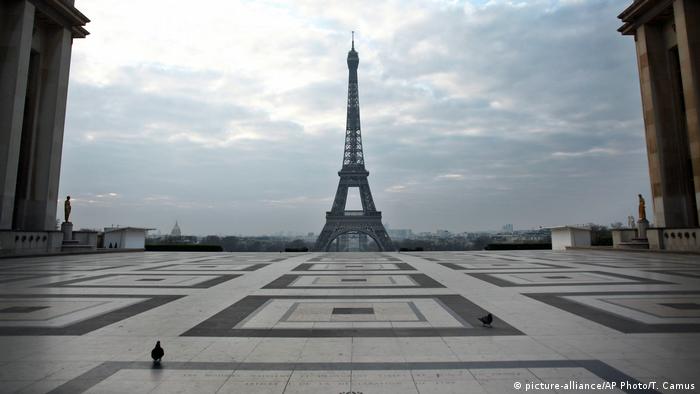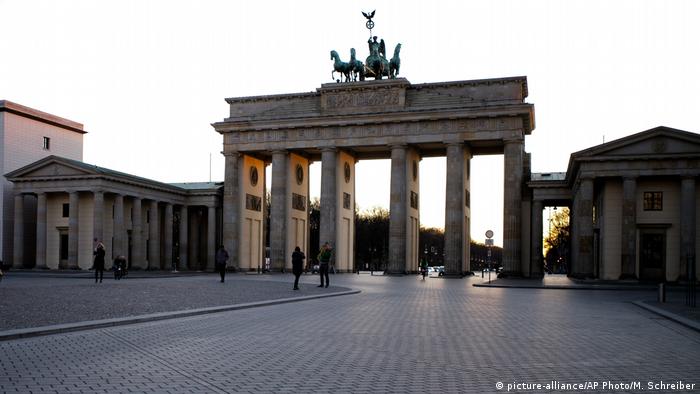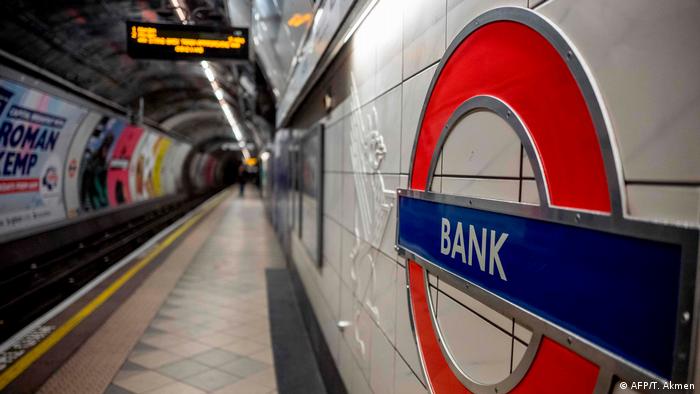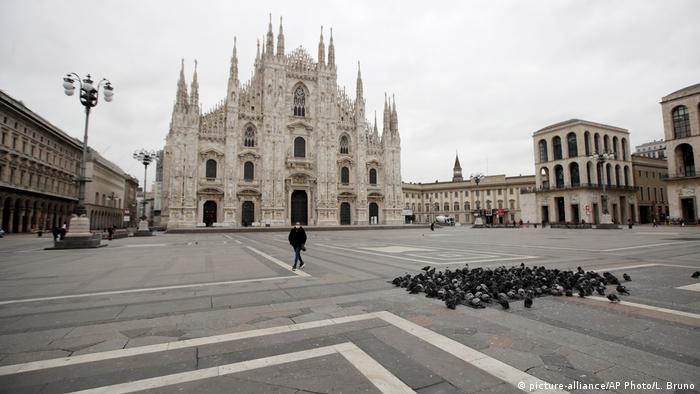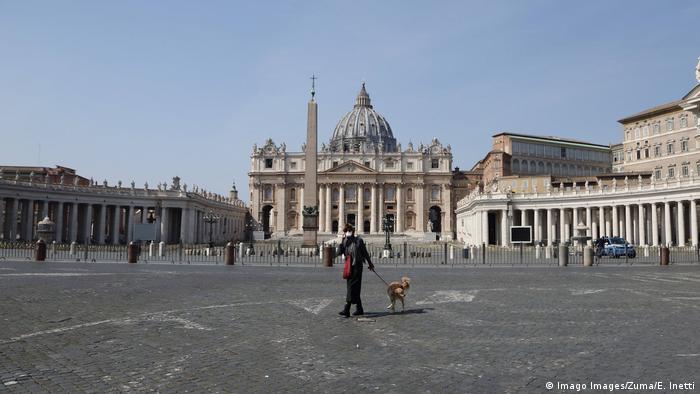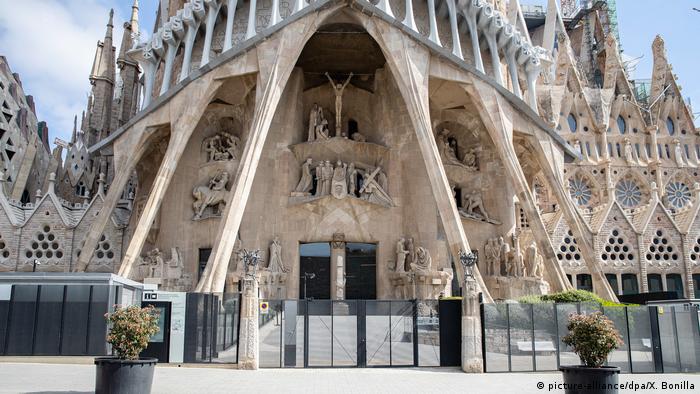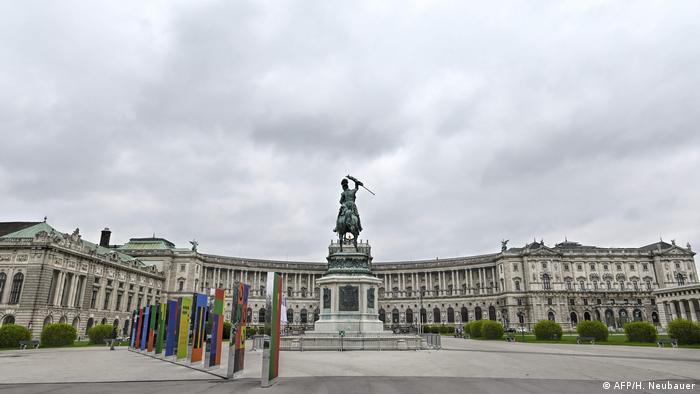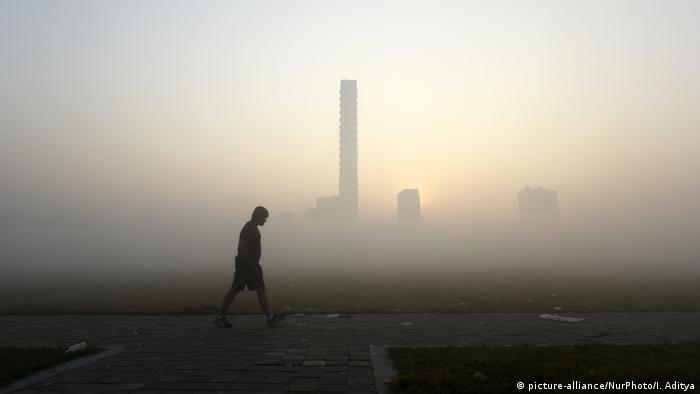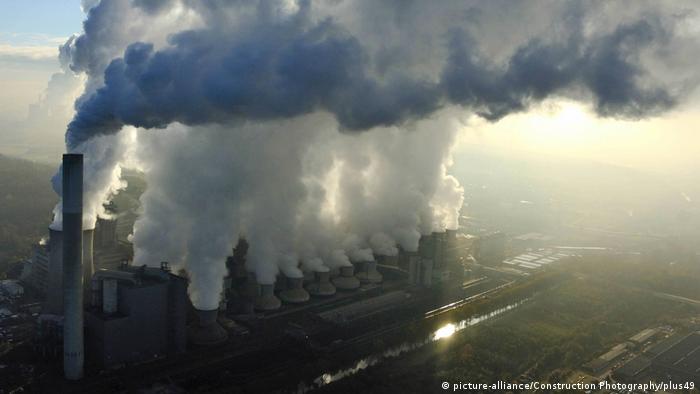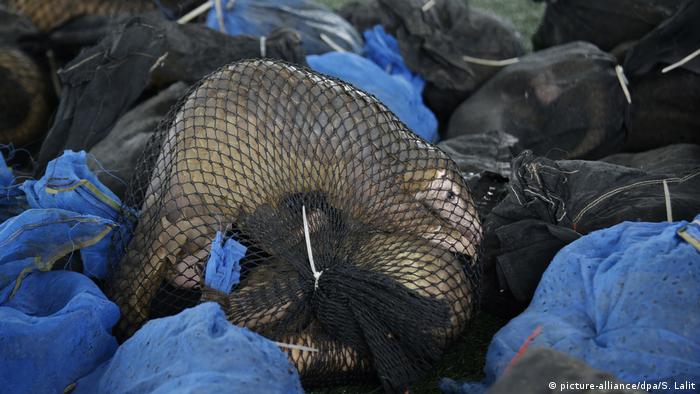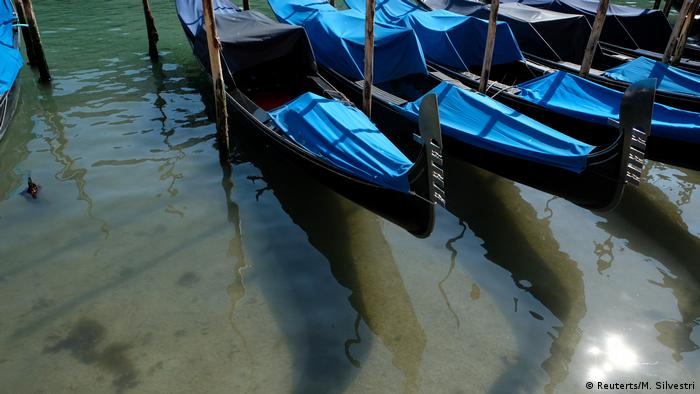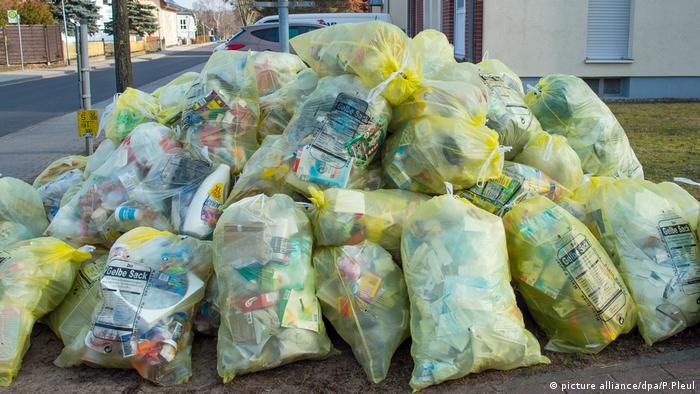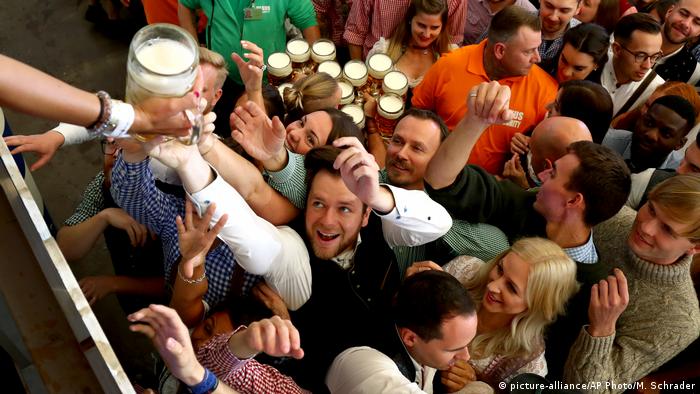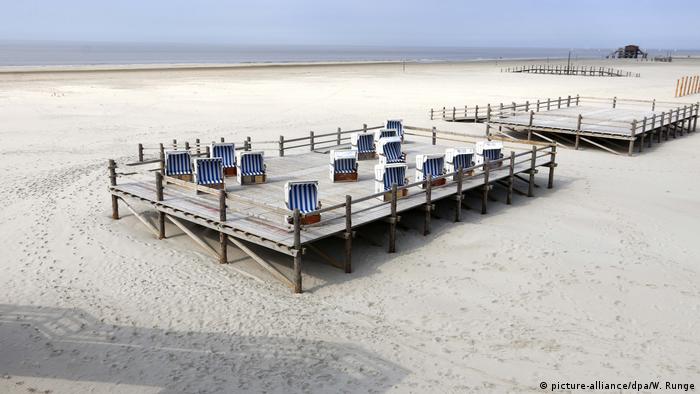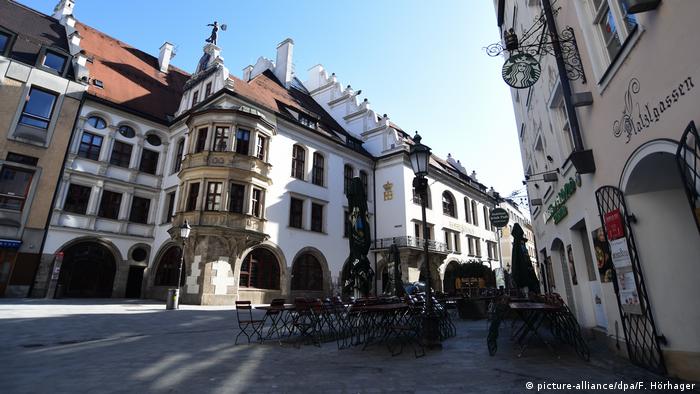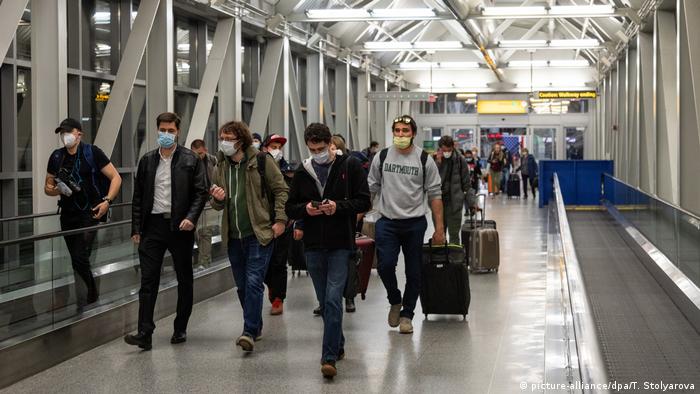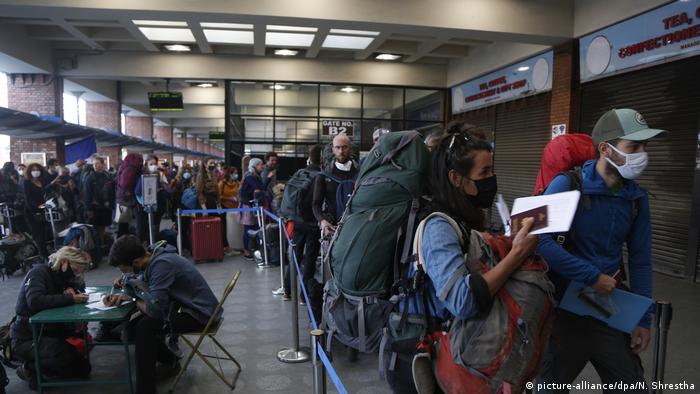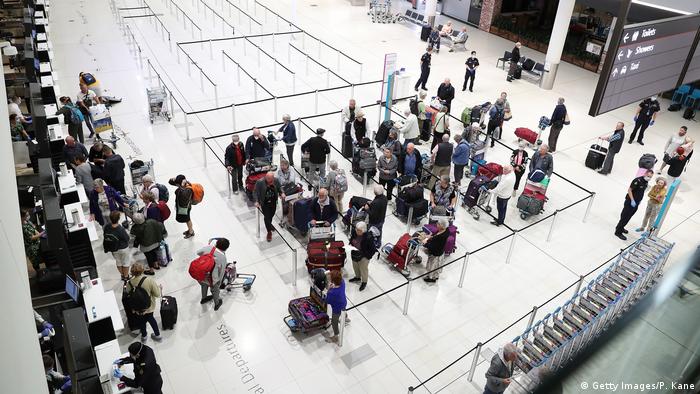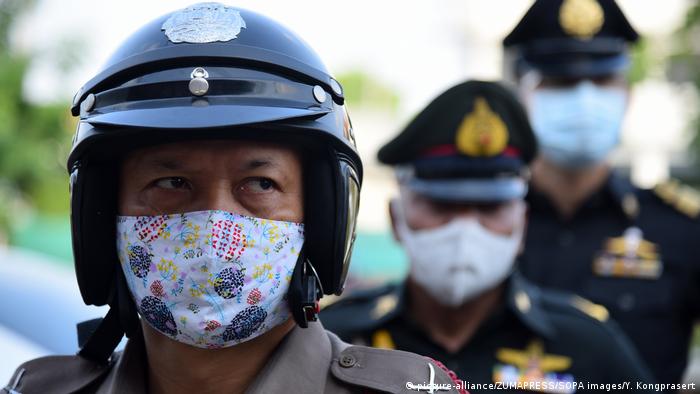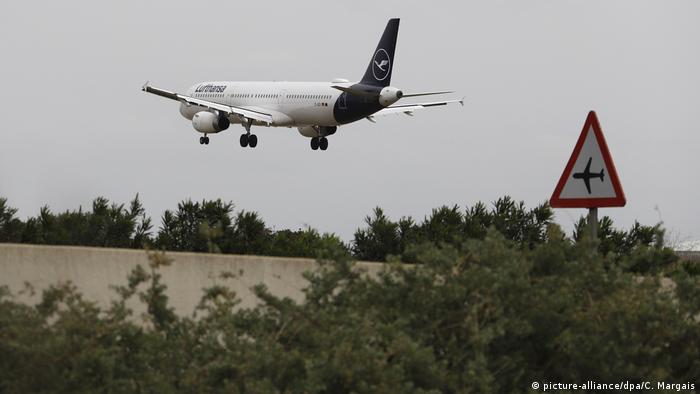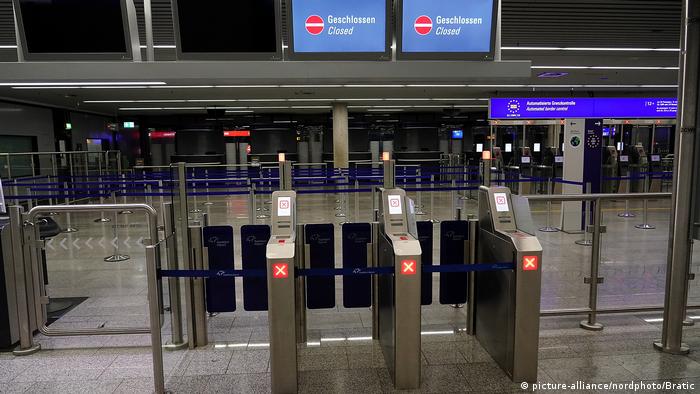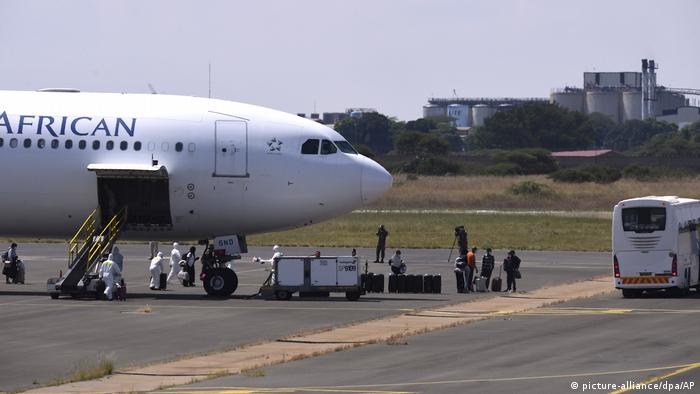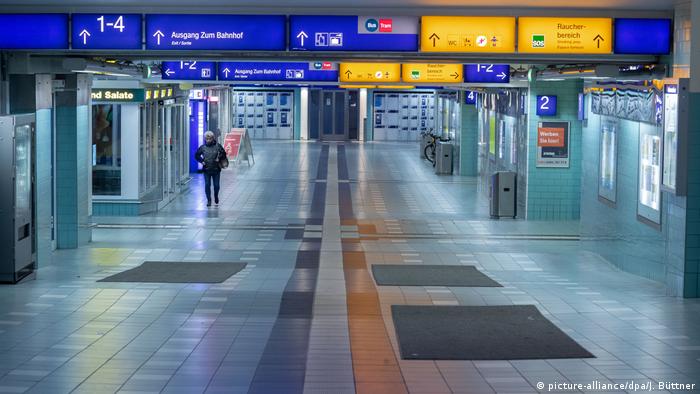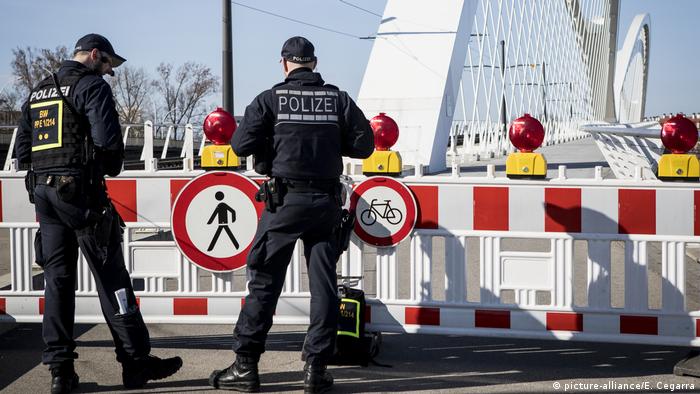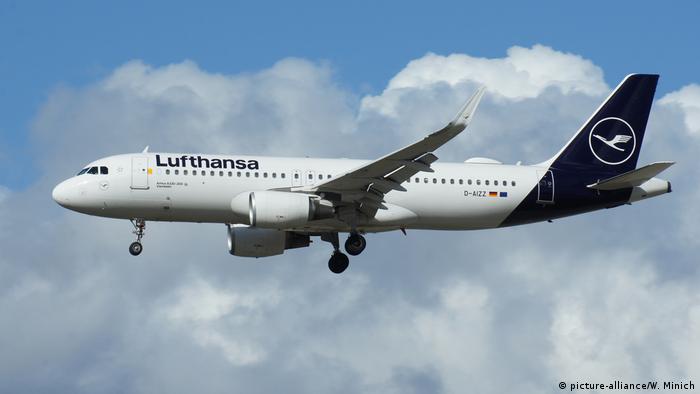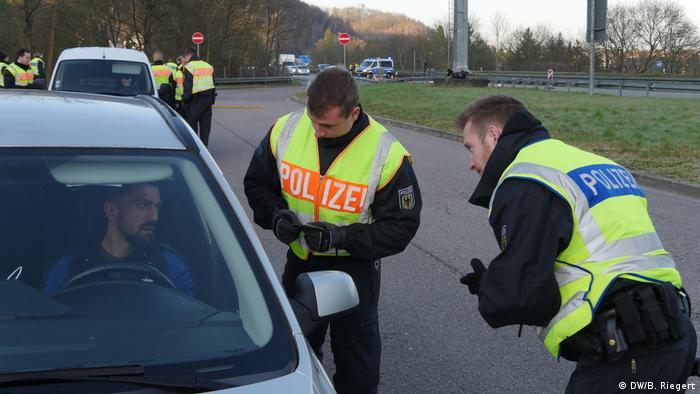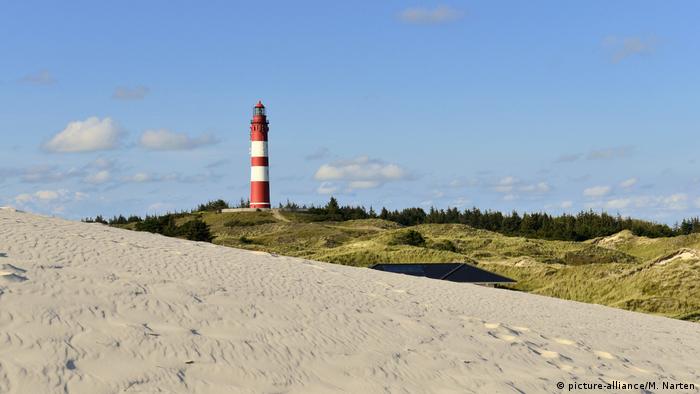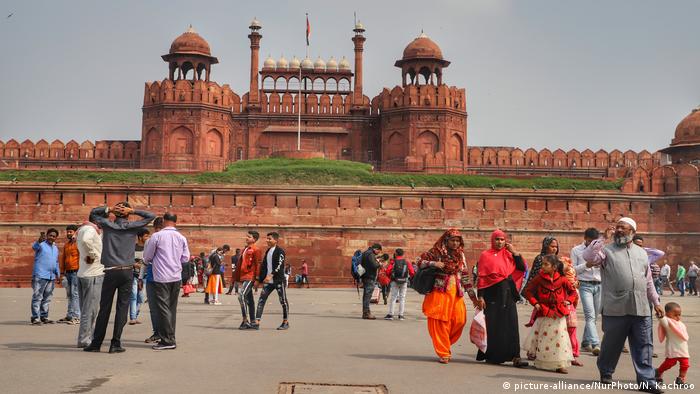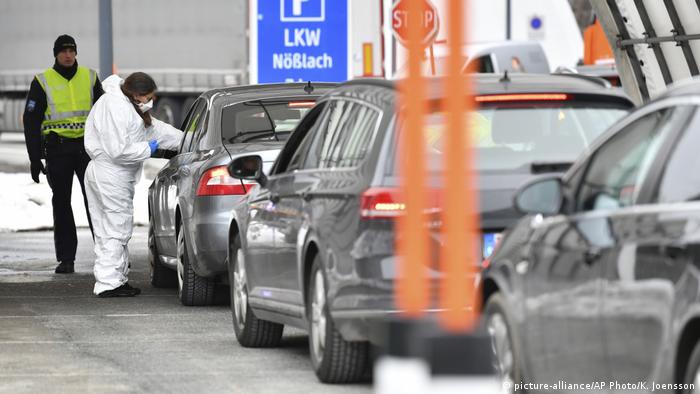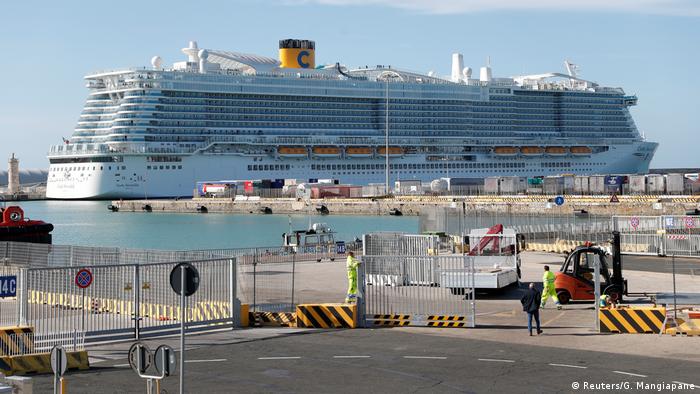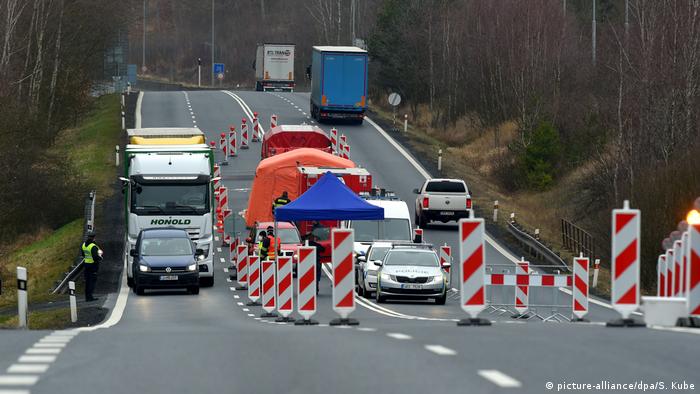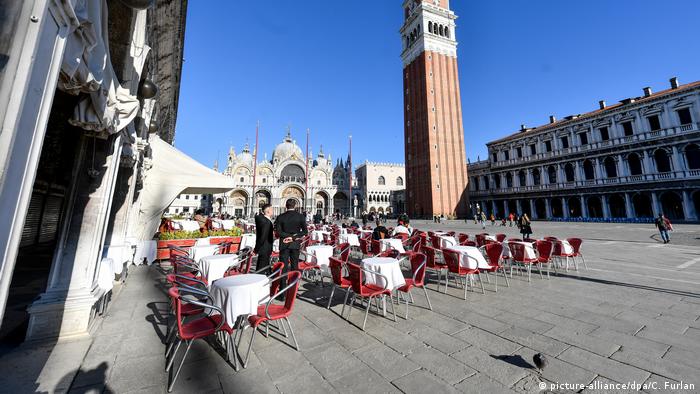Coronavirus latest: Half of European deaths were in nursing homes
Up to half of all coronavirus deaths in Europe were people living in nursing homes, the WHO has said. The agency's director for Europe said care for the elderly has been "notoriously neglected." Follow DW for the latest.
- EU leaders appear to be split on how to help the bloc's economies recover
- New coronavirus infections rise in Germany for the third day in a row
- Google says 'state-sponsored' groups are targeting institutions like the WHO
- New York is launching a campaign to track and isolate COVID-19 cases
- There are over 2,630,000 confirmed COVID-19 cases and 183,500 deaths worldwide, according to the Johns Hopkins Institute
Updates in Universal Coordinated Time (UTC/GMT)
12:35 Africa has registered a 43% hike in reported infections over the last week, sparking fears it could become the next continent to be severely affected.
The continent home to 1.3 billion people has a "very, very limited" and "very, very strained'' testing capacity, John Nkengasong, director of the Africa Centers for Disease Control and Prevention said. As everywhere, the true number of cases is likely to far outstrip the known tally, Nkengasong said.
The World Health Organization recently released a report warning that the pandemic could result in the deaths of some 300,000 people while pushing 30 million into poverty.
Nkengasong also announced that the Jack Ma Foundation belonging to the Chinese billionaire would be donating 300 ventilators to the continent, prioritizing those countries with none available whatsoever. He alluded to the continent's procurement difficulties with medical equipment in unusually high demand.
"We have to recognize that we as a continent are competing for the same resources that everybody else in the world is competing for," Nkengasong said.
12:00 Italy has begun conducting antibody tests in Lombardy, the country's hardest-hit region in the coronavirus crisis. Health authorities are hoping the antibody testing information will serve as a guide as they try to bring the country out of its long lockdown.
The tests, produced by Italian biotech firm DiaSorin, will look for the presence of antibodies in the blood, or exposure to the virus, and point to some level of immunity.
Health authorities in Lombardy have said that some 20,000 tests will be performed every day. Health workers will be tested first followed by those under quarantine showing coronavirus symptoms and those they have been in contact with as well as people with mild symptoms.
But scientists have questioned the reliability of such tests and have warned that there are still many unknowns as to how the body recovers from a COVID-19 infection.
Read more: Coronavirus antibody tests and immunity certificates pose ethical and scientific problems
Recent studies, such as one conducted in March and April by France's Institut Pasteur, have found that so-called "herd immunity" was harder to attain than believed.
Moreover, reports from China, Japan, and Italy of patients who had overcome the virus and then become reinfected, have cast doubt on using "herd immunity" as the rubric to scale back lockdowns.
Some 13,000 people have died of coronavirus in densely populated Lombardy. The figure represents more than half of Italy's total dead.
11:29 UEFA has postponed the Women's European Football Championships to 2022, from its original slot a year earlier, due to a backlog created by the coronavirus.
The tournament was meant to begin in the summer of 2021 but will now start on July 6 the following year after the men's equivalent was pushed back from 2020, overlapping with the women's version of the same event.
It is planned to use the same venues that were originally proposed to host the event in England.
Regarding the rescheduling, UEFA President Aleksander Ceferin said: "When we had to take an urgent decision on the postponement of UEFA EURO 2020, we always had the impact on UEFA Women's EURO 2021 in mind. We have carefully considered all options, with our commitment to the growth of women's football at the forefront of our thinking. By moving UEFA Women's EURO to the following year, we are ensuring that our flagship women's competition will be the only major football tournament of the summer, providing it with the spotlight it deserves."
11:15 Up to half of all coronavirus deaths in Europe have taken place in nursing homes, according to the World Health Organization's (WHO) European office, which called the findings an "unimaginable tragedy."
In a press briefing, WHO Europe Director Dr. Hans Kluge said a "deeply concerning picture" was coming to light regarding the impact of the virus on long-term homes for the elderly, where care has "often been notoriously neglected."
Kluge said the health workers in these institutes, who are often overworked and underpaid, are the "unsung heroes" of the pandemic. He called for them to be given more protective gear and support.
The director said that despite signs of stabilization, the crisis is far from over, and that in the last week case numbers have increased in the east, in Russia, Turkey, and Ukraine in particular. Currently, around half of global infections and deaths are in Europe.
11:00 Taiwan has extended a ban on transit passengers and the limits on direct flights to and from China, in continued efforts to shield the island from the coronavirus pandemic.
Since mid-March, Taiwan has seen a surge of imported cases of COVID-19. As of Thursday, the self-governing island has reported a total of 427 infections and six deaths.
Most foreigners have been barred from entering Taiwan, including from nearby China, Hong Kong and Macau.
But some direct flights connecting Taiwan and the four Chinese cities of Beijing, Shanghai, Chengdu and Xiamen are still being allowed.
However, those permitted to enter the country, including Taiwanese nationals, have been required to adhere to a 14-day home quarantine.
Taiwan's government has not said when the travel restrictions, which were due to expire in late April, will be lifted.
10:50 A cruise ship that became Australia's largest single source of coronavirus infections has set sail from the country's shores one month after authorities ordered it to leave.
The Ruby Princess cruise ship has been linked to 19 deaths in Australia and two in the United States. Australia has seen 75 coronavirus fatalities.
The cruise ship is the subject of a criminal investigation into why 2,700 passengers were allowed to come ashore in Sydney on March 19 before test results had revealed which people had fallen ill with COVID-19.
The Australian state of New South Wales (NSW) has since banned cruise ships from calling at its ports until the federal government can agree on new health protocols.
State police had ordered all foreign cruise ships to leave NSW in late March over fears that sick passengers and crew could overwhelm Sydney hospitals.
The cruise ship's departure was delayed after crew members fell ill, including several whom have since died in Sydney hospitals.
Some 300 Filipino crew members left the ship on Thursday to catch a chartered flight to Manila. Over 500 crew members remain on board.
The ship's operator, Princess Cruises, said the Ruby Princess is now headed for the Philippines.
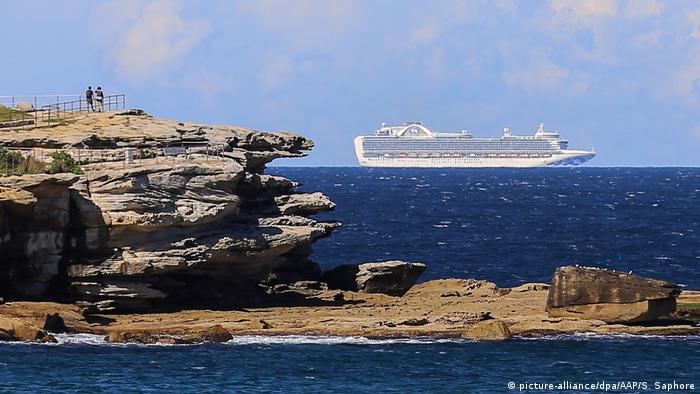
The Ruby Princess set sail for the Philippines
10:10 France's economic activity has been reduced to a bare minimum by the coronavirus pandemic, the country's national statistics office said. Officials are currently weighing the risks of reopening the economy even while the country's infection rate remains high.
"Like a person placed under anesthesia, the French economy can now ensure only its vital functions," the statistics office INSEE said.
The office estimated that activity in the private sector, which accounts for three-fourths of French GDP, has fallen by 41%.
Industries including construction, restaurants, and tourism have come to a virtual standstill since France enacted lockdown orders in mid-March.
Over 10 million employees in the country — one out of every two working in the private sector — have been laid off since the stay-at-home orders took effect. That number is likely to rise, the government said earlier this week.
With economic pressure mounting, France currently hopes to allow all retailers to reopen on May 11.
"Out of fairness, we want all retailers to be able to open on May 11," French Finance Minister Bruno Le Maire told radio broadcaster France Info.
It remains unclear whether this will be possible on a national level, or only on a regional level.
Restaurants, bars, and cafés will remain closed.
09:40 Thai police have arrested numerous individuals over scams involving the sale of face masks.
A 25-year-old man and his 38-year-old step-mother were among those arrested for conning almost 1.5 million baht ($46,000, €42,600) out of a victim who thought she was buying face masks from a police officer. It is not known why she wanted so many masks, a police statement said.
In another case, a 30-year-old woman was detained after advertising masks and other products on Facebook but allegedly did not send the products. The woman had swindled over 200,000 baht from more than 100 people, police said.
Authorities also said there were two other instances involving the sale of overpriced masks. Those found guilty of overpricing goods can face up to five years in prison and a fine of up to 100,000 baht.
Wearing face masks have become the norm in the Asian country since the outbreak as officials have repeatedly urged citizens to wear them.
Thailand has so far reported a total of 2,839 cases and 50 deaths related to COVID-19, according to the government's official figures.
09:30 A potential COVID-19 vaccine should not be expected before 2021, the president of the German Paul Ehrlich Institute, Klaus Cichutek said, one day after the institute authorized a clinical vaccine trial.
The ultimate goal is to create a vaccine that is both effective and without harmful side-effects, Cichutek told German public broadcaster Bayerischer Rundfunk.
The Paul Ehrlich Institute, an organ of the federal government, gave the green light for the biotech company BioNTech to begin the critical trial on some 200 participants. If successful, larger clinical trials involving thousands or tens of thousands of participants would follow.
Cichutek said the initial results from the first critical trial could arrive within three months.
08:50 Finnish Prime Minister Sanna Marin will work from home for the foreseeable future, her office announced Thursday. The precautionary measure was made after Marin was informed that a close contact working at her official residence tested positive for COVID-9.
"The possibility of exposure is extremely low," an official statement said, adding the Finnish PM was symptomless and feeling fine.
The individual who has contracted the virus was asymptomatic. The person did not meet the prime minister, her family members or her advisory staff when working at the residence, the office said.
08:35 China's Foreign Ministry has suggested that Australia's call for an independent probe into the coronavirus epidemic was nothing more than political maneuvering and said the country should end its ideological bias.
Earlier, Australian Prime Minister Scott Morrison had said that all members of the World Health Organization (WHO) should cooperate with an independent review, highlighting China as fundamental in the investigation. However, China has rebuffed the proposal, suggesting it is politically motivated.
Meanwhile, China has pledged an additional $30 million to the WHO to help the global fight against the COVID-19. The announcement comes in the wake of the United States’ decision to suspend its financial contribution to the organization.
08:25 The UK's poor coronavirus testing capacity could further delay efforts to scale back a strict lockdown that has badly hammered its consumption-based economy, Deutsche Bank (DB) warned.
"The UK is lagging behind almost any medium to large economy globally when it comes to coronavirus tests," Deutsche Bank's Oliver Harvey said in a note to clients.
"This will materially impact the government's ability to pursue a 'test-and-trace' approach when it comes to easing the lockdown," Harvey added.
DB's warning comes as British Prime Minister Boris Johnson is recuperating from COVID-19 complications at his country residence. He faces criticism from opposition politicians and some epidemiologists for reacting too slowly to the outbreak.
British Health Secretary Matt Hancock promised 100,000 tests per day by the end of this month, but as of April 21, only 22,814 tests had been carried out. In total, 559,935 people have been tested in the UK.
Britain has 18,100 deaths due to COVID-19 and over 134,600 confirmed cases, according to Johns Hopkins University statistics.
07:30 "Merkel came out as the mother of the nation," said DW's political editor Michaela Küfner, adding that the chancellor told people the government does not have all the answers and that the country will have to live with the social restriction for the foreseeable future.
"[Merkel] spoke like a true world leader and there is a clear recognition here in Germany that as Europe's largest economy it will be footing a significant chunk of the bill of this crisis," Küfner said.
07:05 While speaking to the lower house of German parliament, Chancellor Angela Merkel said the country would be forced to deal with the coronavirus pandemic for a long time to come.
"We’re not living in the end phase of the pandemic," she said. "We’re just at the beginning."
Merkel said making the decision to impose restrictions on public life was one of the hardest of her chancellorship.
"We cannot return to life before the pandemic," she said. "Our everyday lives will be different."
She said Germany had not passed the peak in combatting the virus and Merkel said that even as the speed of the virus' spread slowed, the country was on the "thinnest of thin ice" as the statistics showed developments that occurred 10 days earlier.
While trying not to step on the toes of state leaders, Merkel said she was concerned some of the country's 16 states could be lifting social distancing restrictions too quickly.
"I feel I must admonish everyone not to trust in the principle of hope," she said. "Let us not risk a relapse and losing what we have gained. It would be a terrible shame if our hope punishes us."
Merkel added that it is the government's goal that the health care system not become overwhelmed, as has been seen in other countries. She also said she aimed to make €500 billion in rescue funds available by June.
"The pandemic has shown that it isn't good when all medical equipment comes from abroad," the chancellor said, adding that Germany and the EU would take steps to become more independent in producing personal protective gear.
Ahead of an EU leader's summit set to take place by video conference later on Thursday, Merkel said some form of joint debt will play a role in European discussions.
"In this crisis, we need to show who we are and who we want to be in Europe," Merkel said, adding that Germany would consider a larger contribution to the bloc's budget.
06:30 The coronavirus pandemic has pushed German consumer morale to a record low, market research institute GfK’s consumer sentiment indicator has revealed.
After registering 2.3 points earlier this month, the indicator fell into negative territory and currently sits at -23.4 points.
"The consumer climate is currently in free fall," Rolf Bürkl, a GfK researcher said in a statement. A value of -23.4 is unprecedented in the history of the consumer climate survey, he said.
"Retailers, manufacturers and service providers must prepare for an imminent, very severe recession," Bürkl said.
Gfk's consumer sentiment indicator is based on a survey of 2,000 German consumers.
The German tendency to save in a crisis has exacerbated the fall, Bürkl said.
A survey tracking consumer income expectations also fell in April to its lowest level since the study began in 1980.
"The fear of job loss has risen sharply among many employees," Bürkl said. "This is a significant barrier to consumption, which is intensified by the fact that closed shops often make it impossible to buy stuff."
06:00 The president of the World Medical Association, a federation of national medical associations, has criticized the decision taken by all German states to require residents to wear face masks in public.
"I wear a mask out of politeness and solidarity, but I think making it a legal requirement is the wrong move," association president Frank Ulrich Montgomery told German daily the Rheinische Post. "People wearing masks think they are safe, and they forget the most important factor, which is keeping a minimum distance from other people."
Montgomery added that wearing the masks improperly could be more dangerous than not wearing them at all. The virus collects in the fabric of the mask, which makes it very easy to become infected when removing it from your face, he explained.
He said only real medical face masks should be required and that requiring the use of scarves or other fabric is "laughable."
At the same time, he said, all "truly effective masks" need to be reserved for use by medical personal.
05:40 Companies in Germany expect restrictions to public life to last for a total of 3.9 months, according to survey figures released Thursday from the country's ifo Institute, a think-tank that tracks the German business climate.
The new figures reveal that 50% of German companies have introduced Kurzarbeit, or short-time work, while 18% of firms want to cut jobs.
Short-time work is a mechanism in Germany that allows companies hit in an economic downturn to either send their workers home or significantly reduce their hours without having to lay them off with the state paying some of the employees' wages.
"For many companies, short-time work is the method of choice to cushion a lack of sales and to retain their workforce in the short term," director of the ifo survey Klaus Wohlrabe said.
Around 15% of companies have halted production or closed.
Some 84% of survey respondents said they have noted a decline in sales due to the coronavirus crisis, though 45% believe they can make up the loss in the future.
Some 41% of companies in the industrial sector, and 53% in trade, have experienced problems getting essential supplies delivered.
The coronavirus outbreak has caused 76% of German companies to increase their number of employees working from home.
05:10 UN Secretary-General Antonio Guterres said the coronavirus pandemic is ''a human crisis that is fast becoming a human rights crisis.''
In a video message posted on his Twitter account, Guterres warned about the pandemic's ''disproportionate effects on certain communities, the rise of hate speech, the targeting of vulnerable groups, and the risks of heavy-handed security responses undermining the health response.''
He added that with ''rising ethnonationalism, populism, authoritarianism and a push back against human rights in some countries, the crisis can provide a pretext to adopt repressive measures for purposes unrelated to the pandemic.''
04:50 New coronavirus cases in Germany rose by 2,352, according to the Robert Koch Institute (RKI), Germany's public health institute. The new toll put the total number of infections nationwide at 148,046.
Thursday marked the third consecutive day of rising infections, just as federal states across the country are beginning to loosen up lockdown restrictions. Germany also tallied 215 COVID-19 deaths, for a total of 5,094, RKI said.
RKI figures rely on data from state and local health officials and are updated around once a day, which can lead to deviation from other published statistics, such as those from the Johns Hopkins University.
04:00 European Union leaders will meet by videolink on Thursday for negotiations over an economic aid package to help the bloc's economies recover from the coronavirus pandemic.
Although all of the EU's 27 member states have agreed that a stimulus package potentially amounting to hundreds of billions of euros will be necessary, there are deep divisions over how it should be funded.
Intensions reminiscent of the Eurozone financial crisis, heavily indebted southern states are again depending on relatively financially stable northern countries to do the heavy lifting.
Spain and Italy, which were both severely impacted by COVID-19, are demanding "solidarity" from countries like Germany and the Netherlands, which have rejected the idea of a mutualized EU debt scheme known as "coronabonds."
However, there are low expectations for a breakthrough on Thursday, with one diplomat telling the AFP news agency that leaders are not even expected to issue a joint statement following the meeting.
In an invitation letter, EU Council President Charles Michel urged EU leaders to "work towards" a European Recovery Fund aimed at the long-term rebuilding of the bloc's economy after the pandemic subsides.
The leaders are expected on Thursday to ask the European Commission to provide an estimate of the needs for long-term financial aid. They will also sign off on the 540-billion-euro ($584-billion) emergency aid package agreed to by EU finance ministers earlier in April.
"A different instrument is on the table," Franziska Brantner, a member of the Bundestag for Germany's Green party, told DW when asked about her party's insistence on using so-called "coronabonds" in this current crisis.
"I know that the government and conservative forces have tried to frame it as the same debate as in 2008," said Brantner. But "it is not about us shouldering Italian debt," she stressed, dismissing allegations that coronabonds would essentially be a new version of eurobonds, which led to deep divisions between EU member states during and after the financial crisis a decade ago.
03:50 Two house cats have become the first pets to be diagnosed with the novel coronavirus in the US. The Centers for Disease Control and Prevention (CDC) postulated that the cats had contracted the virus from a human being. The pet cats, who live in New York state, are expected to fully recover.
The CDC urged people to not take action against their pets that could "compromise their welfare." The health institute added that there was still no evidence that pets played a role in spreading the virus.
02:45 Australian Prime Minister Scott Morrison said Thursday that all members of the World Health Organization (WHO) should cooperate with an independent review into the spread of coronavirus proposed by the Australian government.
"If you're going to a member of a club like the World Health Organization, there should be responsibilities and obligations attached to that," Morrison told reporters in Canberra.
"We'd like the world to be safer when it comes to viruses ... I would hope that any other nation, be it China or anyone else, would share that objective."
02:30 Daimler AG, one of Germany's biggest automakers, has forecast a 78% drop in earnings before interest and tax (EBIT) to €617 million in the first quarter of 2020. The automaker's Mercedes-Benz Cars and Vans business unit, which makes the iconic Mercedes-Benz branded cars, predicted a more than 55% drop in EBIT. Daimler said that the results were impacted by falling consumer demand owing to the COVID-19 pandemic.
The company said that its total unit sales for 2020 was expected to be lower than that of last year, with a fall expected across all vehicle types – cars, vans, trucks and buses. This is expected to push down the bottom line.
Daimler's dim forecast follows that of BMW AG, another German automaker. The luxury carmaker reported a 21% drop in group sales in the first quarter of 2020, earlier this month.
02:00 The working group of trade and investment of the G20 nations met on Wednesday to discuss actions to mitigate the effect of the coronavirus pandemic on trade, investment and supply chains.
The group also discussed speeding up economic recovery through increased international investment. Meanwhile, Australia, a G20 member, called on member nations to end wet wildlife markets.
"There are risks with wildlife wet markets and they could be as big a risk to our agricultural industries as they can be to public health," said David Littleproud, Australia's minister for agriculture.
00:10 Parties in Germany's governing coalition have agreed on a financial aid package to protect employees and companies from the economic impacts of the coronavirus pandemic.
Due to the coronavirus crisis shutting down vast swaths of employment sectors, short-term unemployment benefits will be extended and increased in stages.
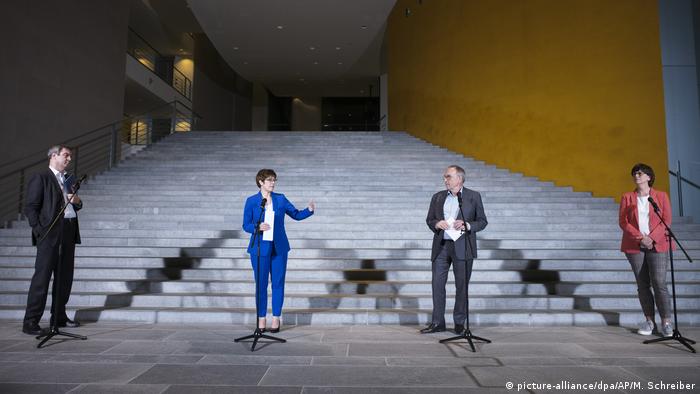
Details of the aid package measures were announced at a press conference complete with social distancing
Workers who have had their hours reduced by 50% will receive an increased payment of up to 77% of total net income after the fourth month of receiving benefits. Those still receiving benefits after seven months will receive between 80 and 87%. The current level of compensation is between 60 and 67%.
The German Federal Employment Agency provides short-time unemployment benefits when employers are forced to temporarily shorten workers' hours. The scheme is also designed to prevent people from permanently losing their jobs due to "unavoidable" events.
The aid package also includes tax relief for the hard-hit catering industry and small businesses, with the Value Added Tax lowered to 7%.
Catch up on Wednesday's coronavirus news here.
The German Federal Institute for Vaccines, the Paul Ehrlich Institute (PEI), gave the green light for Germany's first clinical trials of a potential vaccine against SARS-CoV-2.
The "BNT162b1" vaccine, was developed by Mainz-based pharmaceutical company BioNTech, and the first part of a two-part clinical trial will involve 200 healthy volunteers between the ages of 18 and 55.
The aim is to determine the immune response and whether the vaccine causes any unwanted side effects. The second phase of testing will focus on higher-risk individuals.
The vaccine's developer, Ugur Sahin, said BNT162b1 is a so-called RNA vaccine, which uses genetic material from the virus to stimulate an immune response in the body.
"Trials of vaccine candidates in humans are an important milestone on the road to safe and efficacious vaccines against COVID-19 for the population in Germany and internationally," the PEI said in a statement.
Google has warned that "state-sponsored" hackers are targeting international institutions like the WHO with phishing and malware attacks.
The WHO, and other health bodies directing a worldwide effort to combat COVID-19, have come under sustained digital attacks by those searching for data connected to the pandemic.
Google said it had so far identified 18 million malware and phishing Gmail messages a day connected to COVID-19.
The US state of New York will soon coordinate with neighboring New Jersey and Connecticut on putting together a "tracing army" to find and isolate people infected with COVID-19 and trace the contacts of anyone infected, New York governor Andrew Cuomo says. New York City and the surrounding region are at the epicenter of the outbreak in the US.
In reporting on the coronavirus pandemic, unless otherwise specified, DW uses figures provided by the Johns Hopkins University (JHU) Coronavirus Resource Center in the United States. JHU updates figures in real time, collating data from world health organizations, state and national governments and other public official sources, all of whom have their own systems for compiling information.
Germany's national statistics are compiled by its public health agency, the Robert Koch Institute (RKI). These figures depend on data transmission from state and local levels and are updated around once a day, which can lead to deviation from JHU.
jcg, wmr/sms (AFP, AP, Reuters, dpa)
DW sends out a daily selection of the day's news and features. Sign up here.
tinyurlis.gdv.gdv.htu.nuclck.ruulvis.netshrtco.detny.im

